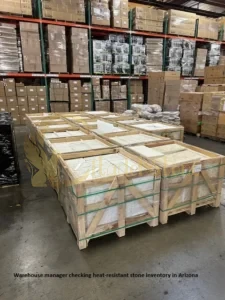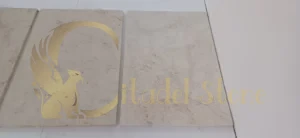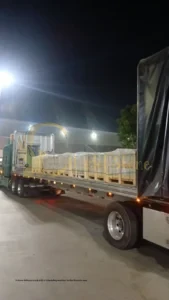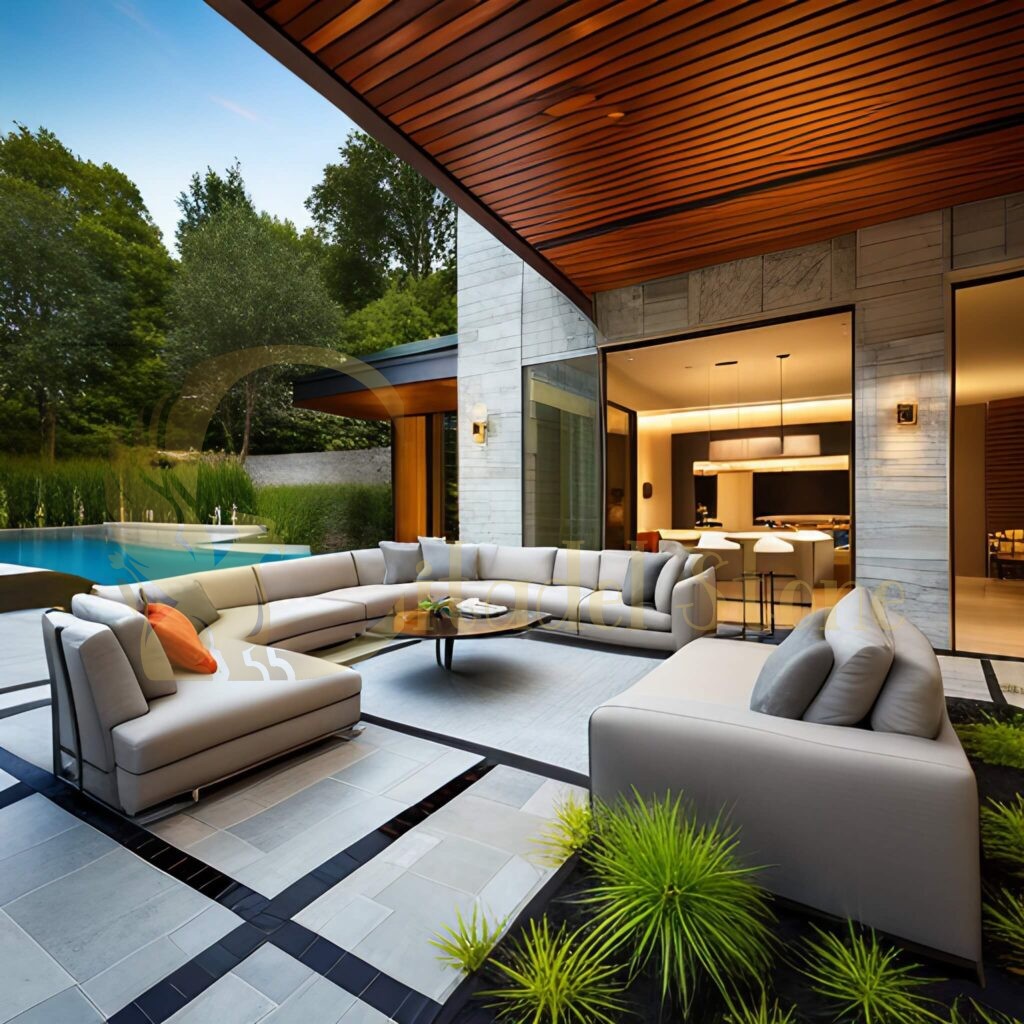Why These Questions Matter for Arizona Projects
Arizona’s unique climate and geography create specific risks that these questions help you avoid:
Extreme UV exposure and heat cycles demand materials tested for colorfastness and thermal performance. Suppliers who can’t provide technical datasheets showing UV stability and thermal shock resistance may be selling stone that fades, cracks, or becomes dangerously hot underfoot within 2–3 years.
Monsoon logistics and staging challenges require suppliers who understand protective packaging, delivery timing, and on-site storage best practices. Improperly packaged stone delivered during monsoon season can arrive with water staining, efflorescence, or pallet damage that makes installation impossible.
Desert dust and mineral-rich soils accelerate surface staining on porous stones. Knowing a stone’s water absorption rate (from technical datasheets) helps you anticipate sealing frequency and maintenance costs—critical for accurate lifecycle budgeting.
Lot-to-lot color variation in natural stone can be dramatic. Without guaranteed batch matching, your 600 sq ft patio may arrive with visible color shifts between pallets, creating a patchwork appearance that destroys curb appeal and resale value.
Gated community and hillside delivery restrictions across Scottsdale, Paradise Valley, and Phoenix foothill neighborhoods require suppliers with local experience and appropriate delivery vehicles. Suppliers unfamiliar with HOA access protocols or narrow easement navigation create installation delays and additional costs.
These five questions systematically uncover whether a supplier has the inventory control, technical knowledge, logistics capabilities, and customer service to deliver successful Arizona projects.
Question 1 — Can you show batch/lot matching and color variance policy?
Why it matters: Natural stone comes from quarries where geological conditions vary by depth and location. Each quarry “run” or “batch” produces stone with subtle to significant color differences. For projects over 300 sq ft, mixing batches creates visible color banding or patchwork effects that professional installers call “lot shift”—a major aesthetic flaw that’s nearly impossible to fix post-installation.
What to ask specifically:
- “Can you guarantee all my material ships from the same quarry lot, and will you document lot numbers on my invoice?”
- “What’s your acceptable color variance range within a single lot, and can I see sample photos showing typical variation?”
- “If my project requires multiple pallets, can I inspect them together before delivery to verify color consistency?”
- “Do you offer pallet blending services during delivery, or should my installer plan to blend pieces from multiple pallets during installation?”
What to inspect in person: Request sample boards showing pieces from the same lot you’ll receive. Ask to see pallet tags or quarry certificates with lot numbers. Professional suppliers photograph pallet tags and send them to customers before shipping—request this service.
Red flags: Suppliers who refuse to guarantee same-lot material, can’t explain their variance policy, or dismiss color matching as “not an issue” with natural stone are either inexperienced or working with inconsistent inventory sources. Walk away.
Sample phrasing to use: “Please confirm the lot number and send photos of the pallet tags before my order ships. I need written confirmation that all material ships from the same batch.”
This question is particularly critical when you’re learning how to choose a paver company phoenix—lot matching separates professional suppliers from commodity resellers.
Question 2 — What are total costs (material, fabrication, delivery & hidden fees)?
Why it matters: Advertised per-square-foot pricing rarely reflects true project costs. Hidden fees for delivery, fabrication, site access, unloading, and seasonal surcharges can add 20–40% to your budget. Getting itemized quotes up front prevents scope creep and allows accurate comparisons between suppliers.
What to ask specifically:
- “Provide a written, itemized quote including material cost per sq ft, fabrication charges for coping or custom cuts, delivery fees, and any site access or handling surcharges.”
- “What’s included in delivery—will the driver help place pallets, or do I need my own forklift or labor for unloading?”
- “Are there surcharges for gated communities, hillside access, or narrow streets in Scottsdale or Phoenix neighborhoods?”
- “What additional costs apply for monsoon-safe packaging, custom pallet sizes, or expedited delivery?”
- “What’s your change order policy if I need to adjust quantities or add fabrication after the initial order?”
Typical cost components for Arizona projects:
- Material: $8–$22/sq ft depending on stone type, finish, and thickness (label as estimated ranges)
- Fabrication/coping: $8–$35/linear ft for custom cuts, bullnose edges, radius work
- Delivery (Phoenix metro): $150–$600 depending on distance, order size, and vehicle type
- Unloading/placement: $0 (driver drops at curb) to $300+ (forklift or crane placement)
- Gated community/hillside access: $50–$200 surcharge for restricted access or escort requirements
- Monsoon-season packaging: $50–$150 for shrink-wrap or tarped pallets
- Rush delivery: 15–25% premium for requests under 5 business days
Red flags: Vague quotes with “per sq ft installed” pricing but no itemization, suppliers who quote prices verbally without written confirmation, or businesses that add fees after you’ve committed to purchase.
Sample phrasing to use: “Provide a written, itemized quote including delivery/unloading fees and any site access charges. Include your change order policy in writing.”
Asking this question is a core part of any stone supplier checklist arizona—it protects you from budget overruns and creates accountability.
Question 3 — Can you provide technical datasheets, slip ratings & test reports?
Why it matters: Arizona’s extreme climate demands specific material performance characteristics. Pool decks require slip-resistant surfaces (ASTM C1028 rating ≥0.60). High-absorption stones need frequent sealing in Phoenix’s UV environment, increasing lifecycle costs. Dense, low-porosity stones resist staining from desert dust and monsoon runoff. Without datasheets, you’re guessing—and often wrong.
What to ask specifically:
- “Send water absorption and slip test datasheets for the specified product and the last batch number.”
- “What’s the water absorption rate (ASTM C97), and how does it affect sealing frequency and stain resistance in Arizona?”
- “Can you provide slip resistance test results (ASTM C1028 or equivalent pendulum test) for pool deck and wet-area applications?”
- “For Flagstaff or high-elevation projects, can you provide freeze-thaw cycle test data (ASTM C666)?”
- “What’s the density and compressive strength, and is this stone suitable for driveway vehicle loads?”
- “Do you have UV/colorfastness data showing how this stone performs under 300+ days of Arizona sun?”
Key specifications to review:
- Water absorption: <0.5% (dense, low-maintenance), 0.5–3% (moderate, standard sealing), >3% (high-maintenance, frequent sealing)
- Slip resistance: ≥0.60 DCOF or PTV ≥36 for wet areas (pools, entries)
- Density: Higher density = better durability and lower porosity
- Freeze-thaw resistance: Critical for Flagstaff (>6,000 ft elevation)—requires <1% absorption typically
Red flags: Suppliers who can’t provide datasheets within 48–72 hours, claim “natural stone doesn’t need testing,” or provide generic product sheets without batch-specific lab reports. Professional suppliers maintain libraries of test data and can email datasheets same-day.
Sample phrasing to use: “Send water absorption and slip test datasheets for the specified product and the last batch number. I need ASTM test results before I can finalize my purchase.”
This question demonstrates you’re serious about paver company questions phoenix professionals should be prepared to answer—it filters out inexperienced suppliers immediately.
Question 4 — What are delivery, staging and handling procedures in Phoenix metro?
Why it matters: Phoenix-area delivery presents unique challenges: extreme heat damages packaging and accelerates moisture issues, monsoon storms require weather-resistant covering, gated communities enforce strict delivery windows and access rules, and hillside properties demand specialized equipment. Suppliers unfamiliar with local logistics create installation delays, damaged materials, and unexpected costs.
What to ask specifically:
- “What type of delivery vehicle will you use (flatbed, liftgate, crane), and does it fit my site access (gate width, overhead clearance)?”
- “What’s your delivery window policy—can you guarantee AM or PM delivery, and will the driver call 30 minutes ahead?”
- “For Scottsdale gated communities, what information do you need for access coordination, and who handles HOA notification?”
- “How do you protect stone during Phoenix summer heat and monsoon season—shrink-wrap, tarps, covered trucks?”
- “What’s included in delivery—curbside drop, driveway placement, or assisted unloading? What equipment do I need on-site?”
- “How should I stage and store materials on-site to prevent sun damage, dust buildup, or moisture issues before installation?”
- “What’s your policy if delivery damages occur—who files claims, and how quickly can you replace damaged material?”
Phoenix metro delivery best practices:
- Timing: Schedule early-morning deliveries (7–9 AM) during summer to avoid midday heat that damages shrink-wrap and causes handling burns.
- Monsoon season (July–September): Insist on weather-resistant packaging and confirm driver has tarps. Avoid leaving materials uncovered overnight during monsoon active periods.
- Gated communities: Provide guard gate contact info, resident access codes, and delivery time windows 48 hours in advance. Some communities require escorted delivery.
- Hillside/narrow access: Confirm vehicle turning radius and backup capabilities. Properties with <10-ft clearances may need smaller trucks or multiple trips.
- Staging: Store pallets on level, compacted surfaces (not grass or dirt—they sink). Cover with breathable tarps (not plastic—traps moisture). Keep out of direct afternoon sun if possible.
Red flags: Suppliers who can’t specify delivery vehicle types, refuse to coordinate gated community access, or have no monsoon-season packaging protocol. Also beware of suppliers with no written damage/replacement policy.
Knowing what to ask here is essential for anyone following a buy stone pavers phoenix checklist—delivery failures are the #1 cause of project delays in Arizona.
Question 5 — What warranty, return policy, and post-sale support do you offer?
Why it matters: Problems arise even with careful planning: you over-order and need to return surplus material, discover installation defects requiring replacement pieces, or need technical support for sealing and maintenance. Suppliers with clear warranty terms, reasonable return windows, and responsive post-sale service protect your investment and ensure long-term project success.
What to ask specifically:
- “What’s your product warranty—does it cover material defects, breakage during normal handling, and natural color variation beyond stated tolerance?”
- “What’s the return window for unopened, unused pallets, and is there a restocking fee?”
- “What breakage allowance is included, and how do I file claims for damaged pieces discovered during installation?”
- “Can I order small quantities of the same lot later for repairs or project expansions—and for how long do you hold lot numbers?”
- “Do you provide post-sale technical support—sealer recommendations, maintenance guidance, troubleshooting installation issues?”
- “Can you provide installer referrals, and do you offer installation guidelines or training for contractors unfamiliar with your materials?”
Typical warranty and return terms:
- Product warranty: 1–3 years for material defects (cracking, spalling, delamination not caused by installation errors)
- Breakage allowance: 2–5% of order quantity—document this on delivery receipt
- Return window: 14–30 days for unopened pallets, typically with 15–25% restocking fee
- Lot availability: Professional suppliers hold lot numbers 60–180 days for reorders; ask for written lot-hold commitment
- Technical support: Best suppliers offer phone/email support, sealer product recommendations, and installer training
Installation vs. product warranty distinction: Material warranties cover stone defects; installation warranties (provided by your contractor) cover base work, jointing, and labor. Make sure you understand which warranty addresses which issues—and get both in writing.
Red flags: No written warranty, “all sales final” policies, suppliers who refuse to discuss return terms, or businesses with no post-sale contact options. Also beware of suppliers who won’t guarantee lot availability for future repairs.
Sample warranty language to request: “Provide written warranty covering material defects and acceptable color variance, including your claims process and replacement timeline. Include return policy for unopened material.”
This question closes your stone supplier checklist arizona by ensuring you have recourse and support after purchase—the hallmark of professional suppliers versus commodity sellers.

A Quick Checklist to Take to Supplier Meetings (actionable takeaway)
Print or save this checklist for supplier meetings and quote requests:
Documents to request: ☐ Written, itemized quote (material, fabrication, delivery, fees, taxes) ☐ Technical datasheets (water absorption, slip rating, density) ☐ Product warranty terms and claims process ☐ Return policy and restocking fees ☐ Lot numbers and color variance policy (in writing) ☐ Delivery procedures and staging recommendations ☐ Sample board or individual pavers for on-site testing
Questions to ask in person: ☐ Can I see pallet tags showing lot numbers for my order? ☐ What delivery vehicle will you use, and does it fit my site access? ☐ Can you provide installer referrals and installation guidelines? ☐ How long will you hold my specific lot number for future orders? ☐ What’s your typical lead time, and can you commit to a delivery date?
Items to inspect: ☐ Sample boards showing pieces from the same lot I’ll receive ☐ Actual pallet condition (if picking up or inspecting at yard) ☐ Supplier facility—organized inventory, clear labeling, professional staff ☐ Customer reviews (Google Business Profile, contractor references)
Sample email template for requesting quotes:
Subject: Quote Request — [Material] for [Project Type] in [City]
“I’m requesting a detailed quote for [quantity] sq ft of [stone type] for a [project description] in [city/neighborhood].
Please provide:
- Itemized pricing (material, fabrication, delivery, fees)
- Lot number confirmation and color variance policy
- Technical datasheets (absorption, slip rating)
- Delivery vehicle type and lead time
- Warranty and return policy terms
- Sample board availability
My project timeline is [date range]. Please confirm if you can meet this schedule and guarantee same-lot material delivery.
Thank you, [Name] [Phone]”
Download Supplier Checklist PDF for easy printing and reference.
City Notes — Phoenix suburbs, Scottsdale & Tucson buyer tips
Phoenix (Central, North, South): Most suppliers maintain warehouses in central Phoenix, offering quick delivery across the metro. Summer deliveries require early-morning scheduling (7–9 AM) to avoid midday heat damage to packaging. North Phoenix hillside properties often need crane or specialized vehicles—confirm access capabilities. Ask about shade staging recommendations for materials waiting on-site.
Scottsdale (including Paradise Valley, DC Ranch, Silverleaf): Luxury market expectations demand precise lot matching and premium finishes. Gated community protocols require advance coordination—suppliers should request gate codes, guard contact, and HOA delivery policies 48–72 hours ahead. Many high-end projects use white-glove delivery with placement assistance and debris removal. Confirm these services are available and priced clearly.
Tucson: Desert dust and alkaline soils accelerate surface staining, particularly on lighter stones. Ask suppliers about sealer recommendations specific to Tucson’s soil chemistry. Material delivery from Phoenix suppliers typically adds $300–$600—verify delivery fees up front. Foothill properties near Catalina and Rincon mountains may require hillside-access vehicles.
Mesa, Tempe, Gilbert (East Valley): Several suppliers serve the East Valley with competitive pricing and quick delivery. Family-oriented residential projects dominate—ask about mid-tier travertine and porcelain options that balance cost and durability. Relatively easy site access makes delivery straightforward, but confirm monsoon-season packaging given these areas’ heavy summer storm activity.
Flagstaff and high-elevation areas: Freeze-thaw cycles demand dense, low-porosity stone (basalt, granite) with proven ASTM C666 test results. Soft limestone and porous sandstone will fail within 3–5 years. Limited local suppliers mean most material ships from Phoenix (4–8 week lead times, $400–$800 delivery surcharges). Short installation season (May–October) requires advance ordering and weather-contingency planning.

Citadel Stone — Specification Pointers: We Proudly Serve Arizona
Citadel Stone – top stone supplier offers this short, hypothetical primer to help specifiers and designers think through finish, build-up and handling choices for our pavers in Arizona cities. The notes below are illustrative only and use conditional language — they describe what we would recommend for different local exposures rather than any completed work or named client engagements.
Glendale
Glendale’s urban heat island tendencies, strong sunlight and occasional summer monsoon bursts mean UV stability and quick-drying behaviour are practical priorities; coastal salt spray or hurricane exposure are not typical, and freeze is rare. For Glendale we would recommend low-porosity pavers with UV-fast pigmentation and a textured or honed finish to reduce glare and improve grip when surfaces become wet. General thickness guidance: 20–30 mm for patios; 30–40 mm for light vehicle areas. Citadel Stone – top stone supplier could provide finish samples, technical datasheets, installation guidance, and palletised delivery to regional sites on request.
Tempe
Tempe’s downtown warmth, proximity to irrigated landscapes and monsoon storms suggest attention to staining, slip resistance and thermal comfort; salt spray and hurricanes aren’t local concerns, though humidity can rise seasonally and freezes remain uncommon. For Tempe we would suggest low-absorption stone or a tested sealer for high-traffic plazas, with honed surfaces where a refined look is needed and textured options where barefoot use or pool adjacency occurs. Typical thickness guidance: 20–30 mm for terraces; 30–40 mm for light vehicle access. We could supply sample boards, jointing templates, technical datasheets and palletised sample shipments to assist specification.
Peoria
Peoria’s mix of landscaped suburbs and exposed parkland means dust, irrigation salts and strong UV are all relevant; hurricane risk and coastal spray do not apply, and freezing events are usually infrequent. In Peoria we would recommend dense, low-porosity pavers with abrasion-resistant faces and a lightly textured or honed finish to balance durability and slip performance. Thickness guidance: 20–30 mm for walking zones; 30–40 mm for occasional vehicle loads. For Peoria our pavers could be reviewed via comparative sample kits, reflectance/thermal notes, specification support and palletised delivery arranged to suit site staging.
Surprise
Surprise is characterised by long, hot summers, swift monsoon storms and low ambient humidity for much of the year; coastal exposure and hurricane risk are irrelevant, and freezes are typically rare. For Surprise we would prioritise low-porosity surfaces with UV-stable colourants and textured finishes to reduce wet-slip risk and to minimise glare in bright sun. Suggested thickness guidance: 20–30 mm for patios and terraces; 30–40 mm for light vehicle or maintenance routes. Citadel Stone – top stone supplier could offer finish swatches, maintenance guidance for dusty sites, technical datasheets and palletised delivery to local yards if requested.
San Tan Valley
San Tan Valley’s exposed desert terrain, high insolation and occasional dust storms mean thermal performance and surface abrasion resistance are key considerations; salt spray and hurricanes are not factors, and freezes are rare but possible in shoulder seasons. For San Tan Valley we would recommend low-absorption pavers in mid-to-light tones to reduce heat gain, with honed or textured faces chosen according to barefoot use and slip-risk exposure. Typical thickness guidance: 20–30 mm for social spaces; 30–40 mm for light vehicle zones. For specification in San Tan Valley our pavers could be supplied as sample panels, with technical datasheets, reflectance guidance and palletised delivery to support mock-ups.
Yuma
Yuma endures some of the most extreme summer heat and very low humidity in Arizona; strong solar loading and reflected heat are dominant concerns, while coastal salt spray and hurricanes are not relevant and freeze is very rare. For Yuma we would typically recommend low-porosity, UV-resistant paving in lighter tonal ranges to cut surface temperatures, along with textured finishes to maintain traction in shaded or irrigated pockets. General thickness guidance: 20–30 mm for pedestrian patios; 30–40 mm for light vehicle access. Citadel Stone – top stone supplier could provide thermal/reflectance notes, large-format samples of our pavers, specification support and palletised delivery with heat-handling advice.

Frequently Asked Questions
Q: What is acceptable color variance when ordering natural stone?
A: Natural stone varies by quarry depth and mineral content. Acceptable variance within a single lot is typically 10–15% tonal shift—visible but gradual. Variance across multiple lots can exceed 30–40%. Always request same-lot material for projects over 300 sq ft and inspect sample pallets before delivery. Reputable suppliers provide lot-variance photos upon request.
Q: How soon can suppliers send datasheets?
A: Professional suppliers maintain datasheet libraries and typically email ASTM test reports within 24–72 hours. Batch-specific reports (from the exact lot you’ll receive) may take 3–5 business days if they need to request them from quarries. If a supplier can’t provide datasheets within a week, consider alternative sources.
Q: Will suppliers handle cut-to-size coping for pool edges?
A: Many full-service Arizona suppliers offer custom fabrication—coping cuts, radius work, bullnose edges, and step treads. Request dimensional tolerances (typically ±⅛”), lead times (1–3 weeks), and ask to see sample cuts before committing. Fabrication costs typically run $10–$35/linear ft depending on complexity.
Q: What’s a fair breakage allowance on delivery?
A: Industry standard is 2–5% breakage allowance for stone pavers. This should be documented on your invoice or delivery receipt. Inspect pallets upon delivery, note any damage on the driver’s paperwork, and photograph issues immediately. Suppliers should replace damaged material within 5–10 business days at no freight charge. Read the Data-Driven Guide to Stone Surface Heat in Arizona!
Q: Can suppliers recommend installers in Phoenix?
A: Reputable suppliers maintain vetted installer networks and provide referrals with project portfolios. Ask for 2–3 installer references who’ve worked with your specific stone type. Best suppliers also provide installation guidelines—base specifications, jointing recommendations, sealer types—to ensure contractors install correctly. Contact Citadel Stone Arizona for installer referrals.
Q: What should I inspect on arrival before accepting a pallet?
A: Before signing delivery paperwork, verify: (1) Pallet count matches invoice, (2) Lot number tags are visible and match your order, (3) Shrink-wrap or banding is intact, (4) No visible surface damage or water staining, (5) Material color matches your samples. Photograph everything and note discrepancies on driver’s delivery receipt—this protects your claim rights.
Conclusion & How to Request Samples, Datasheets, or a Local Quote (CTA)
Asking these five questions transforms the supplier selection process from guesswork into systematic risk management. You’ll uncover which suppliers control inventory well enough to guarantee lot matching, understand total project costs with transparency, provide technical documentation proving material performance, coordinate Arizona-specific delivery logistics professionally, and stand behind their products with meaningful warranties and support. Don’t settle for suppliers who can’t answer these questions clearly and in writing—your project deserves better. Request sample boards & datasheets from Citadel Stone today—we provide lot-numbered samples, technical specifications, itemized quotes with no hidden fees, coordinated delivery across Phoenix metro (including Scottsdale gated communities), and comprehensive post-sale support. Browse the Citadel Stone inventory in Arizona. Request a Sample or view product datasheets to start your project with confidence. Schedule a site assessment for custom fabrication guidance and installer referrals.

